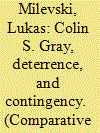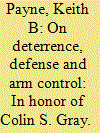|
|
|
Sort Order |
|
|
|
Items / Page
|
|
|
|
|
|
|
| Srl | Item |
| 1 |
ID:
182002


|
|
|
|
|
| Summary/Abstract |
Professor Colin S. Gray dedicated his life to a careful examination of international relations and factors that influence states’ foreign policy and defense choices, among other topics in his excellent scholarship. He was keenly aware of limits of historical understanding for making too confident statements about what the future holds,1 yet Professor Gray’s writings leave one impressed with his prescience. “The future is the past in the ways that matter most,” he wrote in one of his publications and one cannot but think there is a lot of truth to that statement.2 Professor Gray’s selected thoughts on nuclear arms races and arms control, with which this article is concerned, are but a sliver of his extensive and most impressive scholarship on a variety of national security topics.
|
|
|
|
|
|
|
|
|
|
|
|
|
|
|
|
| 2 |
ID:
182008


|
|
|
|
|
| Summary/Abstract |
Colin Gray has made extraordinary contributions to modern strategic thought. His clear thinking and evidence-based argumentation help understand why he has been such an influential commentator on issues that are of enduring concern to policymakers as well as analysts. His contributions to our understanding of key issues of nuclear stability as the Cold War reached a crescendo will be recognized as of enduring importance to bringing the Cold War to a peaceful conclusion. His 1977 volume, The Geopolitics of the Nuclear Era introduced geopolitics to a subject that many had thought had repealed geographic and geopolitical considerations from the policy discourse.
|
|
|
|
|
|
|
|
|
|
|
|
|
|
|
|
| 3 |
ID:
182004


|
|
|
|
|
| Summary/Abstract |
Most scholars as well as practitioners in strategic studies recognize that deterrence is contingent upon the opponent choosing to be deterred. This recognition was a contribution made by Colin Gray to deterrence theory, forcefully if not strictly uniquely, on the basis of the theory of strategy. Although relating the nature of strategy to deterrence led to a powerful reinterpretation of the importance of actor agency in deterrence, it is nonetheless still an incomplete, albeit foundational, appreciation of agency and contingency. To understand fully the role of agency in deterrence, one must also relate it to the nature of political relationships, and thereby identify another contingency point in deterrence.
|
|
|
|
|
|
|
|
|
|
|
|
|
|
|
|
| 4 |
ID:
182013


|
|
|
|
|
| Summary/Abstract |
Colin S. Gray’s The Leverage of Sea Power1 may well be the best book on naval warfare of the last century, if not beyond. This time-span is deliberately chosen, for it excludes Julian Corbett’s Some Principles of Maritime Strategy (1911) as well as Alfred Thayer Mahan’s no less classic The Influence of Sea Power on History, 1660–1783 (1890). Yet a case can certainly be made that Gray’s book belongs in this select company. Comparisons of this sort are inevitably difficult, and are complicated in this case by the fact that these books address very different audiences and differ widely in intention and scope. It is more illuminating to say that if one is to search for true predecessors of Gray’s treatise in the (admittedly slender) literature of naval strategy, perhaps the only really comparable works are Corbett’s masterpiece, England in the Seven Years War (1907), and C. E. Callwell’s virtually forgotten Military Operations and Maritime Preponderance (1905).
|
|
|
|
|
|
|
|
|
|
|
|
|
|
|
|
| 5 |
ID:
182005


|
|
|
|
|
| Summary/Abstract |
For five decades Professor Colin Gray’s scholarly writings contributed tremendously to our understanding of strategy and his wise counsel benefited U.S. security policies enormously. His intellectual depth, rigor, curiosity and wit were unparalleled, as was the time, energy and stamina he devoted to writing and lecturing. To say that Colin was prolific is a profound understatement. His scholarly published canon includes more than 30 books and 300 articles. He also authored or contributed to scores of unpublished reports for various U.S. government offices. To achieve such a record, Colin often would work on multiple texts simultaneously. As a consequence, two substantial books he authored occasionally would be published in the same year—once I believe in the roughly the same month.
|
|
|
|
|
|
|
|
|
|
|
|
|
|
|
|
| 6 |
ID:
182011


|
|
|
|
|
| Summary/Abstract |
There is no place for strategic culture in an intellectual world of indistinguishable billiard balls. In that rarified space, culture is still permitted to exist as a social concept; arguing that all peoples everywhere construct identical societies requires an indifference to contrary evidence so impressive as to be beyond the capacity even of most social scientists. Yet, for a great many IR theorists, culture manages both to be axiomatically central to human life and society and also, somehow, not to matter very much in describing how international relations works. One simply pins on a “neoliberal” or “neorealist” school membership badge and gets on with the business of crafting theoretically elegant models of how humans and their institutions act. Or, at least, how they would act if people were not irritatingly mammalian. The tendency of individuals to respond to stimuli with something other than perfectly rational responses carefully calculated to optimize their interests, as those interests are ranked and prioritized by theorists, is inconvenient.
|
|
|
|
|
|
|
|
|
|
|
|
|
|
|
|
| 7 |
ID:
181996


|
|
|
|
|
| Summary/Abstract |
I first met Colin Gray in 1974 in Los Angeles when he spoke at the University of Southern California at the invitation of Professor William R. Van Cleave, the head of USC’s Defense and Strategic Studies Program. In introducing Colin, Professor Van Cleave joked that Colin had written half the books in the library — a prophetic jest.
|
|
|
|
|
|
|
|
|
|
|
|
|
|
|
|
| 8 |
ID:
182010


|
|
|
|
|
| Summary/Abstract |
The foundational work of Colin S. Gray in establishing unorthodox (for the social sciences) and eminently useful intellectual space for the concept of strategic culture is animated throughout by the very practical ambition of executing a strategic plan superior to one’s adversary. The definitions of strategic culture which Gray accepts and endorses across his decades of scholarship are instrumental in nature, aimed at improving the performance of a nation as it exercises its military instrument in the service of intended political aims. Gray himself defines strategic culture as “the socially constructed and transmitted assumptions, habits of mind, traditions, and preferred methods of operation—that is, behavior—that are more or less specific to a particular geographically based security community.”
|
|
|
|
|
|
|
|
|
|
|
|
|
|
|
|
|
|
|
|
|